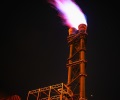Qatar- Cautious optimism about winter demand for LNG

Analysts in the LNG sector believe that demand for this northern hemisphere winter may be better than it was in 2019, as it has been devastated by higher than normal temperatures and the emergence of Covid-19.
A 4% decrease in global gas demand is expected this year.
This is the highest number as per the current estimates, based on a sample of countries and territories that account for more than 85% of global gas demand, and which saw the first six months of 2020 — the most affected period of the year.
Growth in demand for LNG:
Figures released by the National Development and Reform Commission in China show that China actually recorded a 4% increase in demand year-on-year, with emerging markets in Africa, Asia and the Middle East accounting for 25% of all global gas consumption, which is growing.
The more mature markets, which are mostly located in the Northern Hemisphere, which felt the impact of moderate temperatures on gas consumption in the first half of this year, reported most part of the loss in demand and the LNG market will gradually improve as winter approaches.
The demand for LNG is expected to increase by 5bn cubic metres this winter, driven by growth in China, Japan and South Asia.
Gas-fired power generation grew 4.5% year-on-year, and this greater robustness resulted in a revision from 4% to 3% for contraction in demand.
However, the 3% decline will still wipe out 133bn cubic metres of gas demand in 2020 and represent the largest annual decline recorded in the history of the global gas market.
Some of the major individual markets — such as France, Italy and Spain — witnessed a double-digit decline in the first half of the year and analytical expectations indicate that this decline will continue until the end of 2021.
It is clear that the economic slowdown resulting from Covid-19 accompanied by deteriorateing energy and fuel prices is also a material source of uncertainty about a future demand recovery, or any recovery expected in 2021.
Tightening of the LNG market:
The gas market forecast initially indicates more demand this winter, albeit this recovery from low levels brought about by mild weather last year.
‘We expect demand for LNG to rise by 5bn cubic metres this winter, driven by growth in China, Japan and South Asia. The supply of LNG is expected to grow by 3bn cubic metres, led by the United States, when we combine supply and demand forecasts.
Together, we expect the LNG market to be slightly narrower than last winter by 1bn cubic metres.
But caution is also expressed as there are still many risks to the outlook, not the least of which is the usual warning about the temperature and the clearly unusual economic slowdown of the Coronavirus pandemic.
It is expected that two major demand markets that moved in different directions in the past year may see a reversal of their trends.
Japan’s LNG imports fell 4% due to its exposure to the milder winter on record as well as the lower industrial demand hit by Covid-19 this year, while the economic recovery is still very slow in Japan, while the weather pattern will be different this winter.
That means cooler temperatures than last winter.
Gas consumption in China has been hit by Covid-19.
Consumption grew ‘only 1.5% in the first six months of this year.
However, growth picked up over the summer again with a 3.9% expansion.
With winter at the doorstep, growth is likely to maintain momentum.
Moreover, Chinese consumers can take advantage of the favourable energy prices for shipped fuels such as LNG.
While pipeline imports have decreased slightly for 2020, LNG is expected to grow by about 7% in the coming years.
Although transportation costs in the first half are higher compared to the second, the long-term contracts have proven unfavourable compared to the spot market conditions for LNG.
Regardless of future price developments, Chinese companies will increase the use of natural gas in their energy portfolios.
Therefore, it is expected that China will remain the focus of energy companies, given its economic potential in a post-Covid world, where decarbonisation is essential.
For this reason, producers seem striving to make a strategic partnership with China.
Source: Gulf Times

 Hellenic Shipping News Worldwide Hellenic Shipping News Worldwide, Online Daily Newspaper on Hellenic and International Shipping
Hellenic Shipping News Worldwide Hellenic Shipping News Worldwide, Online Daily Newspaper on Hellenic and International Shipping























 PG-Software
PG-Software